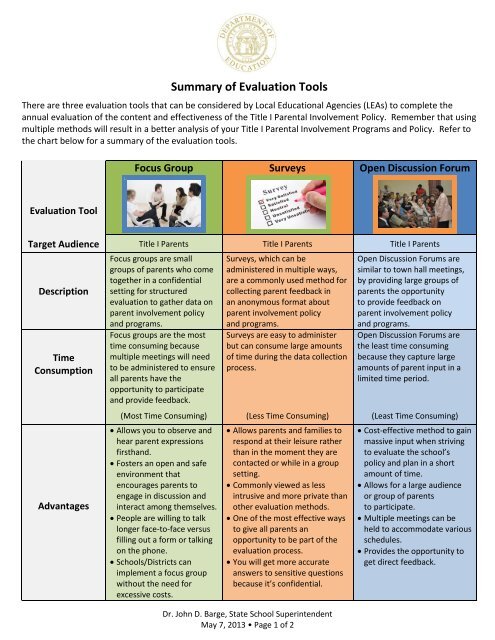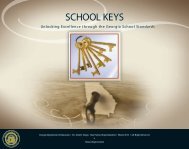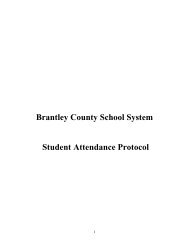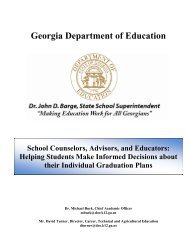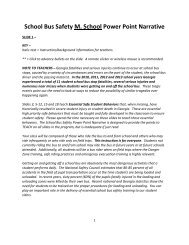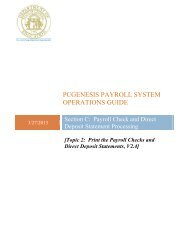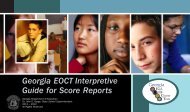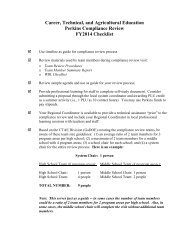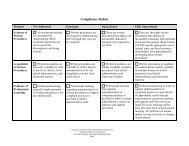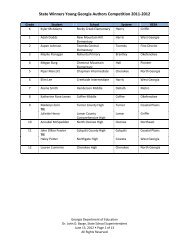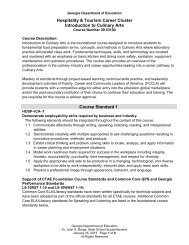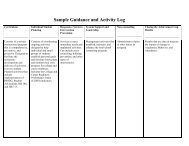Summary of Evaluation Tools Handout
Summary of Evaluation Tools Handout
Summary of Evaluation Tools Handout
You also want an ePaper? Increase the reach of your titles
YUMPU automatically turns print PDFs into web optimized ePapers that Google loves.
<strong>Summary</strong> <strong>of</strong> <strong>Evaluation</strong> <strong>Tools</strong><br />
There are three evaluation tools that can be considered by Local Educational Agencies (LEAs) to complete the<br />
annual evaluation <strong>of</strong> the content and effectiveness <strong>of</strong> the Title I Parental Involvement Policy. Remember that using<br />
multiple methods will result in a better analysis <strong>of</strong> your Title I Parental Involvement Programs and Policy. Refer to<br />
the chart below for a summary <strong>of</strong> the evaluation tools.<br />
Focus Group Surveys Open Discussion Forum<br />
<strong>Evaluation</strong> Tool<br />
Target Audience Title I Parents Title I Parents Title I Parents<br />
Description<br />
Time<br />
Consumption<br />
Advantages<br />
Focus groups are small<br />
groups <strong>of</strong> parents who come<br />
together in a confidential<br />
setting for structured<br />
evaluation to gather data on<br />
parent involvement policy<br />
and programs.<br />
Focus groups are the most<br />
time consuming because<br />
multiple meetings will need<br />
to be administered to ensure<br />
all parents have the<br />
opportunity to participate<br />
and provide feedback.<br />
(Most Time Consuming)<br />
• Allows you to observe and<br />
hear parent expressions<br />
firsthand.<br />
• Fosters an open and safe<br />
environment that<br />
encourages parents to<br />
engage in discussion and<br />
interact among themselves.<br />
• People are willing to talk<br />
longer face-to-face versus<br />
filling out a form or talking<br />
on the phone.<br />
• Schools/Districts can<br />
implement a focus group<br />
without the need for<br />
excessive costs.<br />
Surveys, which can be<br />
administered in multiple ways,<br />
are a commonly used method for<br />
collecting parent feedback in<br />
an anonymous format about<br />
parent involvement policy<br />
and programs.<br />
Surveys are easy to administer<br />
but can consume large amounts<br />
<strong>of</strong> time during the data collection<br />
process.<br />
(Less Time Consuming)<br />
• Allows parents and families to<br />
respond at their leisure rather<br />
than in the moment they are<br />
contacted or while in a group<br />
setting.<br />
• Commonly viewed as less<br />
intrusive and more private than<br />
other evaluation methods.<br />
• One <strong>of</strong> the most effective ways<br />
to give all parents an<br />
opportunity to be part <strong>of</strong> the<br />
evaluation process.<br />
• You will get more accurate<br />
answers to sensitive questions<br />
because it’s confidential.<br />
Dr. John D. Barge, State School Superintendent<br />
May 7, 2013 • Page 1 <strong>of</strong> 2<br />
Open Discussion Forums are<br />
similar to town hall meetings,<br />
by providing large groups <strong>of</strong><br />
parents the opportunity<br />
to provide feedback on<br />
parent involvement policy<br />
and programs.<br />
Open Discussion Forums are<br />
the least time consuming<br />
because they capture large<br />
amounts <strong>of</strong> parent input in a<br />
limited time period.<br />
(Least Time Consuming)<br />
• Cost-effective method to gain<br />
massive input when striving<br />
to evaluate the school’s<br />
policy and plan in a short<br />
amount <strong>of</strong> time.<br />
• Allows for a large audience<br />
or group <strong>of</strong> parents<br />
to participate.<br />
• Multiple meetings can be<br />
held to accommodate various<br />
schedules.<br />
• Provides the opportunity to<br />
get direct feedback.
Disadvantages<br />
• Limits the number <strong>of</strong><br />
opinions at one time that<br />
could come from having a<br />
larger or wider audience.<br />
• Group conversation may be<br />
dominated by only a few<br />
parents.<br />
• The group could be<br />
dominated by only a few<br />
parents, which would result<br />
in only their opinions being<br />
heard.<br />
• The facilitator would have<br />
to find a centralized<br />
location to have the<br />
meetings, send out notices<br />
about the focus group and<br />
make arrangements for<br />
parents without<br />
transportation to attend.<br />
• Not all parents may be able to<br />
participate due to low literacy<br />
levels.<br />
• Requires persistence with<br />
follow-up and tracking to<br />
ensure high response rate.<br />
• Some surveys require parents<br />
to have access to a computer to<br />
participate.<br />
• Mailing surveys can get<br />
expensive with the costs<br />
associated with postage, labels,<br />
copies and envelopes.<br />
• You cannot engage in face to<br />
face interaction to gauge the<br />
conversation and determine<br />
sincerity.<br />
• Finding a centralized location<br />
to host a large meeting<br />
outside <strong>of</strong> the school due to<br />
uncertainty about the size <strong>of</strong><br />
your audience.<br />
• Leading the meeting may be<br />
difficult to facilitate and<br />
ensure you allot time for a<br />
majority <strong>of</strong> parents to<br />
comment.<br />
• It could be hard to regain<br />
control <strong>of</strong> the group once<br />
it is lost.<br />
• The cost <strong>of</strong> transportation<br />
and childcare can cause this<br />
cost-effective meeting to<br />
become expensive if it’s held<br />
multiple times.<br />
Dr. John D. Barge, State School Superintendent<br />
May 7, 2013 • Page 2 <strong>of</strong> 2


